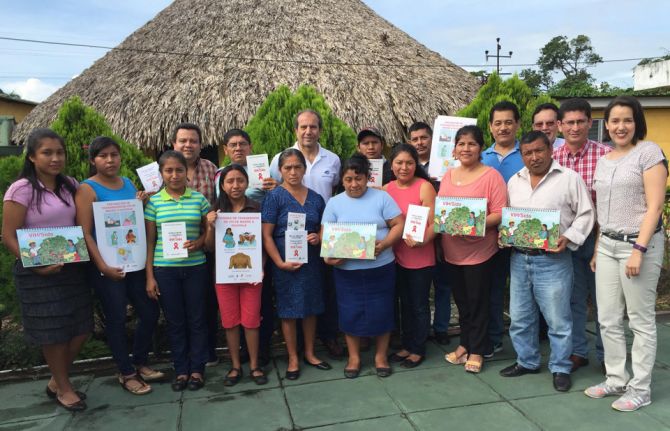

Feature Story
Preventing mother-to-child transmission of HIV in coffee producing areas of Guatemala
08 December 2016
08 December 2016 08 December 2016Preventing mother-to-child transmission of HIV remains one of the major challenges of the AIDS response in Guatemala. In 2015, testing coverage for HIV among pregnant women was 42%. Now, the International Labour Organization (ILO) has teamed up with the Coffee Foundation for Rural Development (Funcafé), the national coffee association, the national AIDS programme and other United Nations agencies, such as UNAIDS and the United Nations Children’s Fund, to promote access to HIV testing, treatment and prevention programmes among women who take up work on plantations during the coffee cutting season.
Seasonal workers employed on coffee plantations often have limited information about HIV and other health issues and restricted access to HIV care and support services. There is also the additional challenge of high levels of mobility and migration among plantation workers. The new programme leverages the network of 16 community health centres established by Funcafé in coffee producing areas of the country’s highlands to provide information related to the prevention of mother-to-child transmission of HIV and to promote the uptake of HIV testing and treatment services for pregnant women.
The project aims to diagnose pregnant women living with HIV and refer them to the official health system for further tests to confirm their status and to start antiretroviral treatment. ILO and its partners provide technical support to train community health workers on providing prevention of mother-to-child transmission of HIV services, bringing HIV treatment and prevention services closer to the people who need them and increasing testing and treatment coverage among pregnant women.
“This is an innovative initiative aimed at strengthening women’s access to prevention of mother-to-child transmission of HIV services by linking the community health system and the national health system and by promoting a multisectoral partnership between the private sector, the Ministry of Health and international partners, with the active participation of communities,” says Ricardo Garcia, UNAIDS Country Director in Guatemala.
Among other aspects, the initiative seeks to train community midwives on HIV prevention and prevention of mother-to-child transmission of HIV on coffee plantations. Midwives play an important role in rural areas as an entry point for pregnant women into the health system. The joint project also aims to raise awareness about HIV prevention and gender equality among male coffee workers and men living in rural areas.
“Workplace settings are an opportunity to provide access to information about HIV prevention tools as well as to promote health, not only among our employees and their families, but in the communities in which we operate, benefiting the entire population,” explains Mynor Maldonado, the Executive Director of Funcafé.
The initiative is part of a wider programme that ILO and UNAIDS have been implementing since 2013. ILO and its partners are exploring similar initiatives with other agribusiness sectors.


